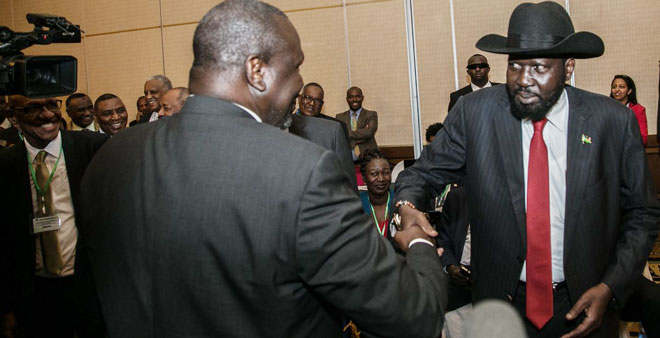
Van Laer said although there have been significant events since the signing of the September agreement, more needs to be done to convince people that this time around, the parties are really committed to implementing the agreement and making sure steps are taken towards a sustainable political settlement.
He noted, however, that this time it appears some regional countries, including Uganda, are more supportive of the agreement than in the past, when they felt western countries had pressured parties to sign. “Also for these regional actors, focus on power-sharing is not sufficient, they should also monitor the implementation of the whole agreement that they brokered, and sanction those that refuse to do so.”
Released just days after the Juba celebrations, the IRRI report was based on research done earlier. At the time, there was an ongoing High-Level Revitalization Forum (HLRF) created by the InterGovernmental Authority on Development (IGAD) to revive the 2015 peace deal.
The report released on Nov.5 noted how respondents regretted the lack of implementation of the 2015 agreement, which the majority blamed on the current government of South Sudan, while others blamed the rebel faction SPLM-IO.
The respondents also criticized IGAD for not sufficiently steering the High Level Revitalization Forum (HLRF) and its member states, especially Kenya and Uganda, and for its bias towards the South Sudanese government.
Several mentioned the reluctance of the government during the talks and its reservations when signing under international pressure; saying it was a precursor to the breakdown of the agreement in July 2016 when fighting erupted again in the capital Juba.
They also pointed to a lack of followup on the agreement by regional and international actors, and to a lack of pressure on the parties, especially the government, to implement it. Likewise, respondents were unanimous in their criticism of President Kiir’s national dialogue process announced in 2016.
Most respondents said it was important to have a countrywide dialogue initiative to collect citizens’ views. According to the report, as soon as minimum requirements related to security and political space are in place, and when those responsible for atrocities are held accountable, getting the views of the people could prevent further violence and address the country’s many structural problems.
There was general consensus that such a forum could go beyond the narrow focus on power-sharing that has dominated the latest regionallyled discussions, and could address contentious issues, such as the number of state or localized conflicts, from escalating.
Going forward, the report recommends that IGAD should press parties to the September 2018 agreement to respect the ceasefire provisions and implement all of its provisions in a timely manner, consulting with citizens about their views.
“IGAD should also ensure independent and adequate monitoring of the 2018 agreement including the ceasefire and security arrangements, and regularly publish its results as well as impose targeted sanctions on actors responsible for obstruction of peace efforts and for atrocities.”
According to IRRI, the African Union should ensure continuous high level diplomatic engagements with all parties to the 2018 agreement while the donors need to support South Sudanese civil society actors in disseminating the 2018 agreement to South Sudanese citizens in and outside South Sudan, in monitoring its implementation as well as in sharing their findings with regional and international actors.
IRRI has also asked donors to support the organisation of a wider national dialogue process based on inclusivity, minimum security requirements, and the acceptance of its facilitation, complementarity with the 2018 peace agreement and a clear mandate and timetable.
“In order to ensure that citizens feel that there will be significant improvement for them this time, setting up a wider dialogue about such issues, this time beyond power-sharing and really including South Sudanese citizens, would be helpful.”
 The Independent Uganda: You get the Truth we Pay the Price
The Independent Uganda: You get the Truth we Pay the Price



